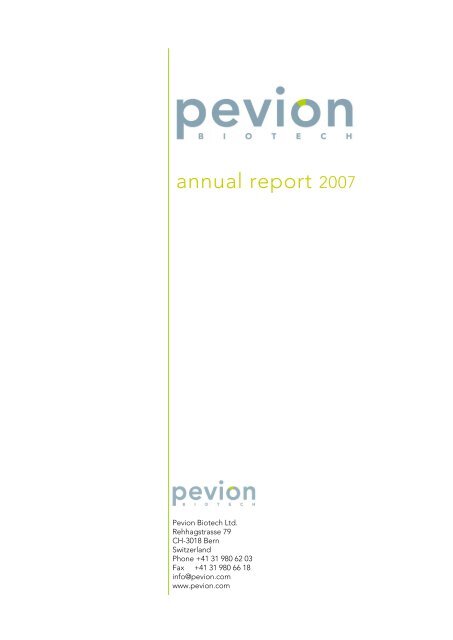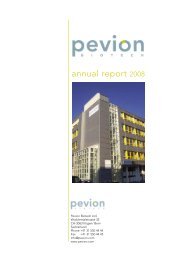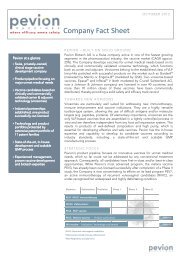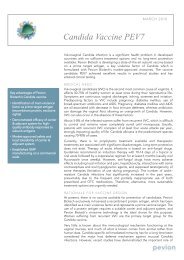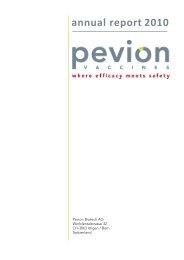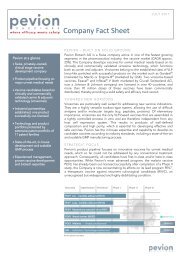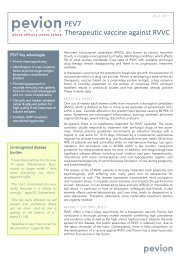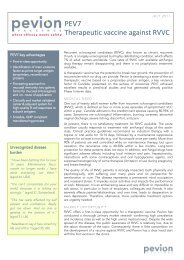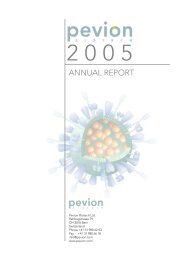You also want an ePaper? Increase the reach of your titles
YUMPU automatically turns print PDFs into web optimized ePapers that Google loves.
<strong>annual</strong> <strong>report</strong> <strong>2007</strong><br />
<strong>Pevion</strong> <strong>Biotech</strong> Ltd.<br />
Rehhagstrasse 79<br />
CH-3018 Bern<br />
Switzerland<br />
Phone +41 31 980 62 03<br />
Fax +41 31 980 66 18<br />
info@pevion.com<br />
www.pevion.com
<strong>2007</strong> ANNUAL REPORT 2<br />
C O N T E N T S<br />
LETTER FROM THE CEO .................................................................................... 3<br />
HIGHLIGHTS <strong>2007</strong> ............................................................................................... 4<br />
COMPANY PROFILE ........................................................................................... 5<br />
VIROSOME-BASED TECHNOLOGY .................................................................. 8<br />
LEAD PROJECTS <strong>2007</strong> ........................................................................................ 9<br />
INTELLECTUAL PROPERTY .............................................................................. 13<br />
<strong>Pevion</strong>_<strong>Biotech</strong>_<strong>annual</strong>_<strong>report</strong>_<strong>2007</strong>.doc
<strong>2007</strong> ANNUAL REPORT 3<br />
L E T T E R F R O M T H E C E O<br />
D E A R S H A R E H O L D E R ,<br />
<strong>Pevion</strong>_<strong>Biotech</strong>_<strong>annual</strong>_<strong>report</strong>_<strong>2007</strong>.doc<br />
<strong>2007</strong> A N N U A L R E P O R T<br />
<strong>2007</strong> was an important year for <strong>Pevion</strong> <strong>Biotech</strong>. Five years after the founding<br />
of the company and soon after passing of a comprehensive due diligence,<br />
<strong>Pevion</strong> <strong>Biotech</strong> raised 35 million Swiss francs (about 22 million euros) in a<br />
Series A private financing round and "attracted the most investment in<br />
Europe" (SCRIP, August 17, <strong>2007</strong>: Private investment round-up early August).<br />
On August 10, <strong>2007</strong> the company closed the round led by BZ Bank. New<br />
investors joining the Series A also included BB <strong>Biotech</strong> Ventures II, L.P. and<br />
CC Private Equity Partners Ltd. The founding investor Bachem Holding <strong>AG</strong><br />
also participated in this financing round. With the secured funds <strong>Pevion</strong><br />
<strong>Biotech</strong> expects to have resources for about 3-4 years.<br />
<strong>Pevion</strong> <strong>Biotech</strong>’s competitive advantages predominantly lie in the marketapproved<br />
virosome technology, which benefits from complete patent<br />
protection. The industrial experience and the broad applicability of this<br />
carrier enable an accelerated product development process. Together with<br />
its excellent safety profile, which also includes broad experience with<br />
children, the elderly and immune-suppressed persons, <strong>Pevion</strong> <strong>Biotech</strong> could<br />
further strengthen its product pipeline. In <strong>2007</strong> the company had three of its<br />
products in clinical testing. The malaria vaccine, the most advanced one, was<br />
in clinical Phase IIa, whereas a breast cancer vaccine and the hepatitis C<br />
vaccine was in clinical Phase I. Additionally, a malaria vaccine Phase Ib trial<br />
sponsored by the Swiss Tropical Institute (STI)was initiated in an epidemic<br />
region (Tanzania).<br />
In <strong>2007</strong> the company started to plan the move to a new facility in 2008. New<br />
premises in Ittigen were selected and detailed plans were ready by the end<br />
of <strong>2007</strong>. The facility will include state-of-the-art laboratories, space for a GMP<br />
unit and office space. The new project is considerably supported by the Bern<br />
Economic Development Agency.<br />
In October <strong>2007</strong> <strong>Pevion</strong> <strong>Biotech</strong> was winner of the Life Sciences Prize in<br />
Basel. The prize, worth 10,000 Swiss francs, stands under the patronage of<br />
the Swiss <strong>Biotech</strong> Association and BioValley Basel. It is awarded to “to a<br />
Swiss Life Sciences firm with the potential for significant scientific and<br />
economic success”.<br />
<strong>2007</strong> was a good fiscal year, as the company received an up-front payment of<br />
several million Swiss francs for an outlicensed product. This puts <strong>Pevion</strong><br />
<strong>Biotech</strong> in a very good financial position and offers a promising outlook for<br />
2008.<br />
I want to thank all employees and the <strong>Pevion</strong> <strong>Biotech</strong>'s Board of Directors for<br />
their work in building this young company. Their tremendous dedication has<br />
placed our company in a very good position for the year 2008.<br />
Sincerely,<br />
Peter Klein<br />
CEO <strong>Pevion</strong> <strong>Biotech</strong> <strong>AG</strong>
<strong>2007</strong> ANNUAL REPORT 4<br />
H I G H L I G H T S 2 0 0 7<br />
<strong>Pevion</strong>_<strong>Biotech</strong>_<strong>annual</strong>_<strong>report</strong>_<strong>2007</strong>.doc<br />
2 0 0 7 A N N U A L R E P O R T<br />
<strong>Pevion</strong> <strong>Biotech</strong> Acquires License for RSV Vaccine from Ruhr<br />
University Bochum<br />
<strong>Pevion</strong> <strong>Biotech</strong> has acquired a license (partial use rights!) for the RSV vaccine.<br />
The vaccine is based on an optimized expression system for mammalian<br />
cells. In combination with its innovative virosome technology <strong>Pevion</strong> <strong>Biotech</strong><br />
is developing a new vaccine against RSV.<br />
<strong>Pevion</strong> <strong>Biotech</strong> and Mymetics Enter License Agreement<br />
Mymetics has signed an exclusive license for the use of <strong>Pevion</strong> <strong>Biotech</strong>'s<br />
virosome-based technology platform for the development and production of<br />
an HIV vaccine.<br />
EU Grant for <strong>Pevion</strong> <strong>Biotech</strong>'s Malaria Vaccine<br />
The EU has awarded several million euros in grants to a total of 13 European<br />
companies and research institutes, of which <strong>Pevion</strong> <strong>Biotech</strong> received 330,000<br />
euros. The grant was awarded to universities and companies in the field of<br />
malaria research and will support the development and clinical studies of<br />
<strong>Pevion</strong> <strong>Biotech</strong>'s safe and effective multicomponent PeviPRO TM malaria<br />
vaccine.<br />
Due Diligence <strong>2007</strong><br />
In Q1/Q2 <strong>2007</strong> <strong>Pevion</strong> <strong>Biotech</strong> concentrated on the preparation of all<br />
documents which are essential for due diligence.<br />
<strong>Pevion</strong> <strong>Biotech</strong> Secures CHF 35 Million in Series A Financing<br />
Round<br />
In August <strong>2007</strong> <strong>Pevion</strong> <strong>Biotech</strong> closed a CHF 35 million Series A private<br />
financing round. The round was led by the new investor BZ Bank<br />
Aktiengesellschaft. New investors joining the Series A round also include BB<br />
<strong>Biotech</strong> Ventures II, L.P. and CC Private Equity Partners Ltd. The current<br />
investor Bachem Holding <strong>AG</strong> also participated in this financing round.<br />
<strong>Pevion</strong> <strong>Biotech</strong>'s Board of Directors Elects New Members<br />
In September <strong>2007</strong> <strong>Pevion</strong> <strong>Biotech</strong> announced the appointment of Dr. Klaus<br />
Breiner, BB <strong>Biotech</strong> Ventures, and Dr. Joseph Manko, BZ Bank<br />
Aktiengesellschaft, as new members to the company’s board of directors.<br />
<strong>Pevion</strong> <strong>Biotech</strong> Winner of the Life Sciences Prize <strong>2007</strong><br />
The prize, worth 10,000 Swiss francs, was awarded for the fourth time. It<br />
stands under the patronage of the Swiss <strong>Biotech</strong> Association and BioValley<br />
Basel, and is intended for young Swiss companies in the <strong>Biotech</strong>, Pharma<br />
and Medtech sectors. Sponsors of the Swiss Life Sciences Prize are<br />
BioMedinvest, Novartis Venture Fund, Varuma and Venture Incubator.<br />
Strong IP Portfolio<br />
<strong>Pevion</strong> <strong>Biotech</strong> extended its portfolio in <strong>2007</strong> by filing two additional priority<br />
claiming patent applications and one international patent application.
<strong>2007</strong> ANNUAL REPORT 5<br />
C O M P A N Y P R O F I L E<br />
<strong>Pevion</strong>_<strong>Biotech</strong>_<strong>annual</strong>_<strong>report</strong>_<strong>2007</strong>.doc<br />
<strong>2007</strong> A N N U A L R E P O R T<br />
<strong>Pevion</strong> <strong>Biotech</strong> is a privately owned Swiss biopharmaceutical company<br />
focusing on the preclinical and clinical development of vaccines to<br />
prevent/treat infectious diseases and cancer. For its vaccine development,<br />
the company uses its virosome technology which is already validated by two<br />
registered and marketed vaccines. The combination of this virosome<br />
technology with novel innovative antigens substantially reduces the known<br />
risk in biotechnological development and permits the targeting of diseases<br />
where so far no appropriate treatment is available.<br />
Since its foundation as an industrial spin-off in 2002 the company has been<br />
focusing on the preclinical and clinical development of vaccines to treat and<br />
prevent infectious and chronic diseases. The target indications represent<br />
major medical needs, including breast cancer, hepatitis C, candidiasis, RSV<br />
and malaria. Three virosome-based vaccine candidates are currently in<br />
clinical development.<br />
<strong>Pevion</strong> <strong>Biotech</strong> has the most complete patent portfolio consisting of license<br />
rights and of patents and patent applications filed directly by the company.<br />
The Intellectual Property Rights cover various aspects and applications of the<br />
technology. The company is also owner of various registered trademarks.<br />
At the end of <strong>2007</strong> <strong>Pevion</strong> <strong>Biotech</strong> had a staff of 21 research fellows, 9 of<br />
whom have a PhD.<br />
<strong>Pevion</strong> <strong>Biotech</strong>'s product pipeline as of December 31, <strong>2007</strong><br />
M A N A G E M E N T<br />
Peter Klein, Chief Executive Officer (CEO)<br />
Peter Klein was head of regulatory affairs at Berna <strong>Biotech</strong> prior to his<br />
employment at <strong>Pevion</strong> <strong>Biotech</strong>. His previous professional activities include 8<br />
years of experience as head of the registration department at the Swiss Drug<br />
Regulatory Authority SWISSMEDIC, 10 years in private consulting to the<br />
pharmaceutical industry (Europe, USA and Japan) and 4 years of<br />
employment in medium-sized pharmaceutical companies in clinical<br />
development and registration of pharmaceutical products. Peter Klein<br />
studied biology at the University of Basel, Switzerland.
<strong>2007</strong> ANNUAL REPORT 6<br />
Dr. Thomas Stauffer, Chief Operating Officer (COO)<br />
Thomas Stauffer joined <strong>Pevion</strong> <strong>Biotech</strong> in 2002. Prior to his employment at<br />
<strong>Pevion</strong> <strong>Biotech</strong>, he served as an IP consultant for small and midsize<br />
biotechnology companies and built and managed a department for IP<br />
services at the Swiss Federal Institute of Intellectual Property. Prior to that,<br />
Thomas Stauffer worked for 3 years at Duke University Medical Center<br />
(Durham, NC). Thomas Stauffer received his degree from the Swiss Federal<br />
Institute of Technology in Zurich, Switzerland.<br />
Dr. Rinaldo Zurbriggen, Chief Scientific Officer (CSO)<br />
Rinaldo Zurbriggen is co-founder of <strong>Pevion</strong> <strong>Biotech</strong>. Prior to joining <strong>Pevion</strong><br />
<strong>Biotech</strong>, Rinaldo Zurbriggen was head of the virus research department at<br />
Berna <strong>Biotech</strong>, where he was responsible for the development of virosomebased<br />
vaccines from 1996 on. During this period his department enabled<br />
Berna <strong>Biotech</strong> to register the first virosome-based vaccine (Epaxal) in Europe.<br />
Rinaldo Zurbriggen is a leading expert for virosomes and has published more<br />
than 30 papers in peer-reviewed scientific journals in this field. Rinaldo<br />
Zurbriggen earned his degree at the University of Fribourg, Switzerland.<br />
B O A R D O F D I R E C T O R S<br />
Peter Grogg, PhD, Chairman of the Board, President, Bachem Holding<br />
<strong>AG</strong><br />
Peter Grogg founded Bachem in 1971 and is chairman of the Board of<br />
Directors of the Bachem Group. He holds main seats on other boards, e.g.<br />
Dottikon ES Holding <strong>AG</strong>, and is management board member of the Swiss<br />
Association for the Chemical Industry and of the Basel Chamber of<br />
Commerce. He was awarded the academic degree of Doctor of Philosophy<br />
honoris causa by the University of Basel, Switzerland.<br />
Kuno Sommer, PhD, Vice-Chair of the Board, CBO Crucell<br />
Kuno Sommer studied business administration at the University of Basel.<br />
Before 1990 he held various positions with Roche <strong>AG</strong> Vitamin Marketing.<br />
From 1990 to 1994 he was head of the North American branch of the Roche<br />
Animal Feed and Health Division, from 1995, manager of global marketing<br />
for the Vitamin and Speciality Chemicals Division in Basel, CEO of Givaudan-<br />
Roure in Geneva and member of the Executive Committee of Roche <strong>AG</strong> in<br />
1998/99.<br />
Klaus Breiner, PhD, Member of the Board, BB <strong>Biotech</strong> Ventures<br />
Dr. Klaus Breiner is a venture capital investor with BB <strong>Biotech</strong> Ventures at<br />
Bellevue Group. The Bellevue Group is one of the largest financial investors<br />
in the health care segment. Dr. Breiner has invested in numerous emerging<br />
biotech and pharma companies in the U.S. and Europe. His current and past<br />
board assignments include Agendia BV, Alpex Pharma SA, Cadence<br />
Pharmaceuticals Inc., Glycart <strong>Biotech</strong>nology <strong>AG</strong>, and Orthocon Inc. Dr.<br />
Breiner holds a PhD in molecular biology and has spent most of his research<br />
career in virology.<br />
Daniel Erne, PhD, Member of the Board, CTO Bachem Holding <strong>AG</strong><br />
Daniel Erne joined Bachem <strong>AG</strong> in 1987 as head of quality control. Since 1997<br />
he has been a member of the corporate executive committee of the Bachem<br />
Group and responsible for quality assurance and regulatory affairs. He<br />
studied chemistry at the Swiss Federal Institute of Technology in Zurich<br />
(ETHZ) and then became a research fellow at the University of Utah, Salt Lake<br />
City and at ETHZ before joining Bachem <strong>AG</strong>.<br />
<strong>Pevion</strong>_<strong>Biotech</strong>_<strong>annual</strong>_<strong>report</strong>_<strong>2007</strong>.doc
<strong>2007</strong> ANNUAL REPORT 7<br />
Joseph Manko, PhD, Member of the Board, BZ Bank<br />
Joseph Manko is an investment banker with extensive experience in the<br />
international securities markets. At BZ Bank, he is responsible for corporate<br />
finance and event-driven strategies. Prior to BZ Bank, Dr. Manko had been<br />
with Deutsche Bank and Merrill Lynch in London, New York and Hong Kong.<br />
Joseph Manko holds a Juris Doctor degree from the University of<br />
Pennsylvania.<br />
S C I E N T I F I C A D V I S O R Y B O A R D<br />
Besides its internal scientists, <strong>Pevion</strong> <strong>Biotech</strong> has established a scientific<br />
advisory board comprised of highly skilled experts, including academic<br />
researchers in immunology, biochemistry as well as clinical oncology.<br />
Professor Albert Osterhaus, DVM, PhD<br />
Professor Osterhaus is a world renowned specialist for infectious diseases<br />
and vaccines. He studied and completed his doctorate at the University of<br />
Utrecht and held various positions at the National Institute of Public Health<br />
and Environment (RIVM) in Bilthoven, the Netherlands. He was directly<br />
involved in the establishment of three companies. Among other positions,<br />
Professor Osterhaus currently holds the position of Professor of Virology,<br />
Erasmus University Hospital, Rotterdam and is member of a number of WHO<br />
committees.<br />
Professor Antonio Lanzavecchia, MD, PhD<br />
Professor Antonio Lanzavecchia is a world renowned immunologist with a<br />
research focus on different aspects of cellular immunology: antigen<br />
processing and presentation, dendritic cell biology, lymphocyte activation<br />
and lymphocyte traffic. He studied at the University of Pavia and then<br />
specialized in pediatrics and infectious diseases. He was a member of the<br />
staff at the Basel Institute for Immunology and became director of the<br />
Institute for Research in Biomedicine in Bellinzona and professor at the<br />
University of Siena. He was awarded the EMBO Medal in 1988 and the<br />
Cloëtta Prize in 1999.<br />
Professor Alan Gewirtz, MD, PhD<br />
The laboratory of Professor Alan Gewirtz focuses on the cell biology of<br />
normal and malignant human hematopoiesis. He began his studies at<br />
Colgate University and became assistant professor at Temple University<br />
School of Medicine. He then was appointed director of the Clinical<br />
Hematology Laboratory at Temple University Hospital as well as associate<br />
professor at the University of Pennsylvania, where he currently heads the<br />
Hematologic Malignancies Program.<br />
Professor Josef Brunner, PhD<br />
Professor Josef Brunner’s most important research topics are the<br />
development of new photochemical marking methods to examine complex<br />
systems, the fusion of biological membranes as well as the role of lipids and<br />
lipid metabolites in signal transduction. He studied at Technical College<br />
(HTL) in Burgdorf, Switzerland and ETH Zurich, where he was awarded the<br />
ETH Silver Medal. After a postdoctorate at the Department of Molecular<br />
Biophysics and Biochemistry, Yale University, he headed his own research<br />
group at ETH Zurich.<br />
<strong>Pevion</strong>_<strong>Biotech</strong>_<strong>annual</strong>_<strong>report</strong>_<strong>2007</strong>.doc
<strong>2007</strong> ANNUAL REPORT 8<br />
V I R O S O M E - B A S E D T E C H N O L O G Y<br />
<strong>Pevion</strong>_<strong>Biotech</strong>_<strong>annual</strong>_<strong>report</strong>_<strong>2007</strong>.doc<br />
<strong>2007</strong> A N N U A L R E P O R T<br />
Virosomes are a market-approved carrier system for the delivery of<br />
pharmaceutically or immunologically active substances, allowing the correct<br />
spatial presentation of peptides and proteins and facilitating delivery of a<br />
vaccine without the use of an adjuvant. They consist of reconstituted empty<br />
influenza virus envelopes devoid of the nucleocapside, including the genetic<br />
material of the source virus.<br />
Influenza virus Virosome<br />
Virosomes are not able to<br />
replicate, but rather are pure<br />
fusion-active vesicles. In<br />
contrast to liposomes,<br />
virosomes contain functional<br />
viral envelope glycoproteins:<br />
influenza virus hemagglutinin<br />
and neuraminidase intercalated<br />
in the phospholipid bilayer<br />
membrane.<br />
The unique properties of virosomes partially relate to the presence of these<br />
glycoproteins. They not only confer structural stability and homogeneity to<br />
virosome formulations, but they significantly contribute to the immunological<br />
properties of virosomes, which are clearly distinct from other liposomal and<br />
proteoliposomal carrier systems. These proteins enable the virosome<br />
membranes to fuse with cells of the immune system and thus deliver their<br />
contents – the specific antigens – directly to their target cells, eliciting a<br />
specific first-class immune response even with weak-immunogenic antigens.<br />
Once they have delivered the antigens, the virosomes are completely<br />
metabolized. Conventional adjuvants like aluminum cannot be degraded by<br />
the body.<br />
PeviPRO TM and PeviTER TM represent <strong>Pevion</strong> <strong>Biotech</strong>'s key technology:
<strong>2007</strong> ANNUAL REPORT 9<br />
N E W I N 2 0 0 7 : M A N U F A C T U R I N G O F L Y O P H I L I Z E D<br />
V I R O S O M E S<br />
<strong>Pevion</strong> <strong>Biotech</strong> is constantly seeking to optimize its vaccine candidates.<br />
Working with synthetic peptides or recombinant proteins often has the<br />
disadvantage of limited stability. In addition, vaccines are temporarily<br />
exposed to elevated temperatures that cause losses in vaccine efficacy.<br />
Lyophilization (freeze-drying) is a process that is especially useful for<br />
enhancing stability for long-term storage of biological materials such as<br />
proteins and vaccines, and it can make refrigerated storage obsolete for<br />
normally temperature-sensitive materials. However, conventional "first<br />
generation" virosomes cannot be lyophilized without loss of<br />
immunogenicity, particle size homogeneity and the functional activity of the<br />
influenza HA. Therefore, <strong>Pevion</strong> <strong>Biotech</strong> has developed a new generation of<br />
virosomes which are able to induce strong immune responses, display a<br />
good antigen encapsulation rate and improved storage and stability<br />
properties. This is combined with a simple and fast preparation method that<br />
offers a great flexibility in combining several specific antigens of choice while<br />
retaining the adjuvant properties and the excellent safety profile.<br />
In <strong>2007</strong> <strong>Pevion</strong> <strong>Biotech</strong> successfully manufactured the first lyophilized<br />
product for the PeviPRO TM platform, which is the malaria vaccine candidate<br />
PEV3B. The lyophilized product meets the stability criteria as expected.<br />
Furthermore, fee-for-service activities in the technology group could be<br />
increased; in <strong>2007</strong> <strong>Pevion</strong> <strong>Biotech</strong> delivered custom formulations to six<br />
companies, of which Mymetics Corp. with its HIV project was the main<br />
customer.<br />
L E A D P R O J E C T S <strong>2007</strong><br />
Development pipeline of <strong>Pevion</strong> <strong>Biotech</strong><br />
<strong>Pevion</strong>_<strong>Biotech</strong>_<strong>annual</strong>_<strong>report</strong>_<strong>2007</strong>.doc<br />
<strong>2007</strong> A N N U A L R E P O R T<br />
<strong>Pevion</strong> <strong>Biotech</strong>’s product pipeline consists of vaccines to treat or prevent<br />
infectious diseases and cancer, representing high unmet medical needs:<br />
Breast cancer<br />
Hepatitis C (HCV)<br />
Candidiasis<br />
Respiratory Syncytial Virus (RSV)<br />
Malaria<br />
Additional products are in preclinical development.
<strong>2007</strong> ANNUAL REPORT 10<br />
P E V I P R O TM B R E A S T C A N C E R V A C C I N E I<br />
<strong>Pevion</strong> <strong>Biotech</strong> has designed a multivalent breast cancer vaccine for patients<br />
in whom the HER-2/neu oncoprotein is overexpressed. In collaboration with<br />
Bio Life Science (BLS) , a biotech company located in Vienna, the protein<br />
sequence of the extracellular domain (ECD) of the human Her-2/neu protein<br />
was scanned by computer-aided prediction, and three peptides were<br />
selected for further investigation. These three synthetic Her-2/neu antigenderived<br />
peptides are presented to the immune system in multiple copies on<br />
the surface of virosomes based on the PeviPRO TM technology platform.<br />
Ongoing clinical Phase I<br />
A Phase I clinical trial started in September 2006 in Vienna. The primary aim<br />
of the study is to examine the safety and tolerability of the synthetic vaccine.<br />
Secondary objectives include assessments of the vaccine’s immunogenicity.<br />
By the end of <strong>2007</strong>, eight patients have been included in the study. The<br />
preliminary results show good safety and immunogenicity data. The study is<br />
scheduled for completion by the end of 2008.<br />
Advantages of a breast cancer vaccine<br />
Breast cancer is one of the most common cancer types among women. More<br />
than 1.2 million women worldwide are affected by breast cancer, irrespective<br />
of age and ethnicity. Some breast cancer patients in whom the Her-2/neu<br />
protein is strongly overexpressed can be treated with an immunotherapy –<br />
Herceptin® (Trastuzumab). The therapy with human-approved monoclonal<br />
antibodies is a passive immunization of the patient, targeting a diseaserelated<br />
molecule, but it must be repeated weekly or monthly and is very cost<br />
intensive.<br />
H C V : T H E R A P E U T I C V A C C I N E I N C L I N I C A L P H A S E I<br />
<strong>Pevion</strong> <strong>Biotech</strong>'s therapeutic HCV vaccine is based on <strong>Pevion</strong> <strong>Biotech</strong>’s<br />
proprietary PeviTER TM technology and has been tested for its safety and<br />
immunogenicity.<br />
New in <strong>2007</strong>: Start of Phase I of <strong>Pevion</strong> <strong>Biotech</strong>'s hepatitis C vaccine<br />
Phase I clinical testing of <strong>Pevion</strong> <strong>Biotech</strong>'s virosome-based hepatitis C virus<br />
(HCV) vaccine started in January <strong>2007</strong>. The study is being conducted under<br />
the direction of Professor Giuseppe Pantaleo, MD, at the Vaccine and<br />
Immunotherapy Center at the University Hospital in Lausanne. Data are not<br />
yet available.<br />
Improvement of virosome-based technology<br />
In October <strong>2007</strong> a scientific paper describing the new type of virosome that<br />
can be lyophilized without loss of activity and immunogenicity was published<br />
in the renowned journal Vaccine. This allowed the presentation of <strong>Pevion</strong><br />
<strong>Biotech</strong>'s achievements to a larger audience.<br />
Need of a HCV vaccine<br />
Hepatitis C is one of the most common blood-borne infections. It is<br />
considered a serious health problem affecting 200 million people worldwide.<br />
85% of infected persons cannot eliminate the virus and about 70% develop<br />
chronic hepatitis. Many of the chronically infected are at risk of developing<br />
liver cirrhosis (20%) and/or liver cancer (hepatocellular carcinoma, HCC) (1-5%<br />
per year). So far, combination therapy with interferon and ribavirin is the only<br />
treatment for chronic hepatitis C. Unfortunately up to 60% of all HCV-<br />
<strong>Pevion</strong>_<strong>Biotech</strong>_<strong>annual</strong>_<strong>report</strong>_<strong>2007</strong>.doc
<strong>2007</strong> ANNUAL REPORT 11<br />
infected patients do not experience significant long-term benefits from this<br />
therapy. Despite great need, no vaccine is yet available.<br />
P E V I P R O TM C A N D I D A V A C C I N E I N P R E C L I N I C A L<br />
D E V E L O P M E N T<br />
<strong>Pevion</strong> <strong>Biotech</strong>'s Candida vaccine is based on the rSap2 antigen, a<br />
recombinant truncated form of the native Sap2, coupled to the surface of<br />
virosomes of the PeviPRO TM technology platform. It is designed to prevent<br />
candidal vulvovaginitis.<br />
New in <strong>2007</strong>: Successful Preclinical Studies in different animal models<br />
for <strong>Pevion</strong> <strong>Biotech</strong>'s Candida Vaccine<br />
The preclinical phase of the project which started in <strong>2007</strong> and has clearly<br />
demonstrated that intravaginal administration of the virosome-based vaccine<br />
in rats generates a good immune response to the native protein in the<br />
vagina and at the same time confers protection against Candida infection.<br />
Additionally, it has been proven that the virosome-based component<br />
enhances both immunogenicity and protective activity of the antigen without<br />
the addition of the most common mucosal adjuvants.<br />
Studies on long-term efficacy of the vaccine in rats have confirmed that the<br />
intravaginal application of the virosomes containing the antigen induces<br />
protection and persistence of the antibodies in the vagina over long time<br />
intervals.<br />
Need of a candida vaccine<br />
Vaginal candida infections have emerged as a significant medical problem<br />
during the last few decades. Candida species usually reside as commensal<br />
organisms as part of an individual’s normal microflora and can be detected in<br />
approximately 50% of the population in this form. However, if the balance of<br />
the normal flora is disrupted, Candida species become pathogenic. Several<br />
drugs, especially OTC products (over the counter), are available for<br />
treatment of fungal infections, but given the continuing increase in the<br />
incidence of infections together with the antifungal drug resistance, Candida<br />
infections pose a significant public health problem.<br />
The majority of cases of Candida vulvovaginitis occur in about 70% of<br />
premenopausal women at least once during their reproductive lives. About<br />
30% of women experience recurrent episodes of the infection during their<br />
childbearing years. About 5% of women with a primary episode subsequently<br />
experience chronic vulvovaginal Candida infections with at least 3-4 episodes<br />
within one year.<br />
There is a need of new antifungal treatment with a greater potential to<br />
prevent vulvovaginal or oral infections, especially chronic and/or recurrent<br />
infections, which pose serious problems for the overall health of the patients.<br />
<strong>Pevion</strong> <strong>Biotech</strong>, together with ISS, Rome, identified an optimal antigen for a<br />
vaccine against candidiasis. In 2006 the project finished the conceptual<br />
phase and entered preclinical development.<br />
<strong>Pevion</strong>_<strong>Biotech</strong>_<strong>annual</strong>_<strong>report</strong>_<strong>2007</strong>.doc
<strong>2007</strong> ANNUAL REPORT 12<br />
P E V I P R O TM R S V V A C C I N E<br />
<strong>Pevion</strong> <strong>Biotech</strong> is developing its prophylactic RSV vaccine based on its<br />
proprietary PeviPRO TM technology platform. In 2006 the RSV vaccine was<br />
further developed and reached preclinical development in <strong>2007</strong>.<br />
New in <strong>2007</strong>: Start of CTI-sponsored collaboration for the development<br />
of a fusion protein based RSV vaccine<br />
In <strong>2007</strong> <strong>Pevion</strong> <strong>Biotech</strong> started collaboration with Professor Florian Wurm,<br />
PhD at EPFL, Lausanne and Professor Christiane Zaborosch , PhD at ZHAW<br />
on the development of a recombinant RSV vaccine based on the fusion<br />
protein of the virus. The recombinant production of the F-protein is achieved<br />
by transient transfection of mammalian cells in the laboratory of Florian<br />
Wurm, an expert in this technology with a lot of experience in transient<br />
expression of various genes. The recombinant protein has proven to be<br />
processed similarly to the viral protein and could be purified by the<br />
protective mAb Synagis, demonstrating proper processing and folding of the<br />
corresponding epitope of the protein, respectively. Immunization of mice<br />
with virosomes carrying the rec. RSV F displayed on the surface induced<br />
antibodies that were able to inhibit the viral infection in vivo to a similar<br />
extent as the viral protein. Purification of the F protein by affinity<br />
chromatography is not suitable for large scale production, thus, an<br />
alternative purification method based on exchange and hydrophobic<br />
interaction has been developed in the laboratory of Christiane Zaborosch.<br />
This material is used for challenge experiments in cotton rats, which were<br />
started in December <strong>2007</strong>.<br />
Need of a RSV vaccine<br />
Although respiratory syncytial virus (RSV) is traditionally regarded as a<br />
pediatric illness, it also causes pulmonary disease in the elderly, particularly<br />
those with underlying heart and lung disease, and in immunocompromised<br />
bone marrow recipients. Even though there is a tremendous need, no<br />
vaccine is yet available. RSV vaccine development is hampered by a number<br />
of obstacles, especially the risk of inducing enhanced illness.<br />
P E V I P R O TM M A L A R I A V A C C I N E<br />
The malaria parasite Plasmodium falciparum has a complex life cycle<br />
involving three stages in the human body. <strong>Pevion</strong> <strong>Biotech</strong> is therefore<br />
focusing on a multicomponent (multivalent) malaria vaccine: Each<br />
component targets another antigen specific to a defined development<br />
stage. <strong>Pevion</strong> <strong>Biotech</strong> uses its well-established virosome technology platform<br />
PeviPRO TM for the delivery of the newly developed peptide antigens into the<br />
human body. In subsequent steps the company has developed the vaccine<br />
formulations to clinical development.<br />
New in <strong>2007</strong>: Clinical Phase IIa with the two-component malaria vaccine<br />
candidate<br />
A Clinical Phase IIa study was completed in 2006, and the final analysis was<br />
available <strong>2007</strong>. Although the vaccinated volunteers did not show sterile<br />
protection against the strong artificial challenge, the data demonstrated<br />
inhibitory effects of the vaccination on the development of the parasite.<br />
Parasites numbers within the blood were significantly lower after vaccination,<br />
and the number of parasites leaving the liver also showed a tendency to<br />
<strong>Pevion</strong>_<strong>Biotech</strong>_<strong>annual</strong>_<strong>report</strong>_<strong>2007</strong>.doc
<strong>2007</strong> ANNUAL REPORT 13<br />
lower parasite load in the vaccinees. Parasites within the blood showed an<br />
unusual morphology ("crisis forms") that has been correlated with protection<br />
in other studies. Unfortunately, an artificial challenge situation does not allow<br />
the follow-up of the parasite development within the blood of the<br />
challenged volunteers. The effect of vaccination on the blood stage of the<br />
parasite can only be tested in the context of field trials in endemic areas. A<br />
Clinical Phase Ib testing of the malaria vaccine candidate in an epidemic area<br />
in Tanzania was planned and arranged during <strong>2007</strong> and will be started in<br />
January 2008.<br />
Need of a malaria vaccine<br />
Malaria remains one of the world’s greatest public health challenges. It is<br />
one of the biggest killers among communicable diseases today. An<br />
estimated 40% of the world’s population are at risk of malaria with 500<br />
million cases <strong>annual</strong>ly, resulting in 1-2 million deaths each year, mostly young<br />
children and pregnant women in sub-Saharan Africa. The emergence of<br />
widespread resistance to anti-malaria drugs such as chloroquine and the<br />
difficulty of controlling the mosquito vector have hampered the control of<br />
the disease. As yet no vaccine is available.<br />
I N T E L L E C T U A L P R O P E R T Y<br />
<strong>Pevion</strong>_<strong>Biotech</strong>_<strong>annual</strong>_<strong>report</strong>_<strong>2007</strong>.doc<br />
<strong>2007</strong> A N N U A L R E P O R T<br />
<strong>Pevion</strong> <strong>Biotech</strong>'s IP portfolio: Two additional applications in <strong>2007</strong><br />
It is <strong>Pevion</strong> <strong>Biotech</strong>’s intention to establish strong exclusive market niches<br />
sustained by strong and preferably exclusive intellectual property rights.<br />
The company's policy is to seek patent protection, whenever possible,<br />
commercially feasible and appropriate, with respect to any technology or<br />
product that is important to the development of the business and in any<br />
geographic area which is relevant for its business.<br />
The company’s proprietary platform technology – the virosome technology –<br />
provides a continuous vehicle to develop new prophylactic and therapeutic<br />
vaccines. Most of the company’s patents and patent applications protect the<br />
virosome technology by claiming various aspects and applications.<br />
Furthermore, the company has filed patent applications, which beyond the<br />
virosome technology cover new antigens which are used for the design of<br />
new and attractive vaccines.<br />
In line with its strategy to focus on continuous improvement of its technology<br />
and dedicated product development, the company in <strong>2007</strong> assigned one<br />
patent family related to a new adjuvant which was not in use for any product<br />
development. However, to extend its portfolio, <strong>Pevion</strong> <strong>Biotech</strong> filed two<br />
priority claiming patent applications and one international patent application<br />
(PCT) in <strong>2007</strong> related to new product antigens and the virosome technology<br />
respectively.<br />
Two patents were granted to <strong>Pevion</strong> <strong>Biotech</strong> in <strong>2007</strong> covering an important<br />
aspect of the technology and an antigen used in product development.<br />
In total, by the end of <strong>2007</strong> <strong>Pevion</strong> <strong>Biotech</strong> owned 14 patent families related<br />
to the virosome technology and the product-specific aspects of every<br />
individual product candidate in development. These 14 families consist of 2<br />
granted patents and 41 patent applications. The IP portfolio furthermore<br />
comprises several patent families licensed from third parties.
<strong>2007</strong> ANNUAL REPORT 14<br />
<strong>Pevion</strong> <strong>Biotech</strong> Ltd.<br />
Rehhagstrasse 79<br />
CH-3018 Bern<br />
Switzerland<br />
Phone +41 31 980 62 03<br />
Fax +41 31 980 66 18<br />
info@pevion.com<br />
www.pevion.com<br />
<strong>Pevion</strong>_<strong>Biotech</strong>_<strong>annual</strong>_<strong>report</strong>_<strong>2007</strong>.doc


